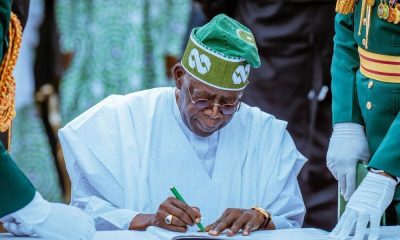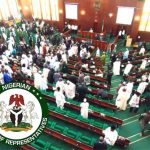President Bola Ahmed Tinubu made significant legislative strides in 2024, signing several transformative bills into law.
These include increasing the national minimum wage, establishing a student loan fund, tackling illegal arms proliferation, and creating development commissions for the South-East and North-West regions.
Each bill addresses critical gaps in education, infrastructure, workers’ welfare, and national security, marking a step forward in Nigeria’s socio-economic development.

Major Bills Signed Into Law by President Tinubu in 2024: A Step Towards Socio-Economic Growth
In 2024, President Bola Ahmed Tinubu demonstrated a commitment to addressing critical gaps in Nigeria’s socio-economic framework through the enactment of several landmark bills.
These legislative milestones reflect the administration’s intent to tackle challenges across various sectors, including education, infrastructure, workers’ welfare, and security. Below is a detailed account of the major bills signed into law by the president during the year.
1. Defence Corporation Bill
Date Signed: February 9, 2024
The Defence Corporation Bill, also known as the Electricity Act (Amendment) Bill, aims to address developmental and environmental concerns in host communities of power-generating companies (GENCOs). Key provisions include:
- Allocating 5% of the actual annual operating expenditures of GENCOs for the development of their host communities.
- Ensuring these funds are managed by a reputable Trustee/Manager jointly appointed by the GENCOs and host communities.
- Focusing on infrastructure development to enhance the quality of life in affected areas.
This legislation is seen as a step toward fostering sustainable development and mitigating environmental degradation in host communities.
2. National Student Loan Bill
Date Signed: April 2024
The National Student Loan Re-enactment Bill established the Nigerian Education Loan Fund (NELFUND) to provide financial aid to students in tertiary institutions.

Key features include:
- The relaunch of a previously delayed initiative introduced in 2023.
- Provision of financial assistance to students to ensure access to quality education.
- Simplified application processes to ensure inclusivity for eligible students.
This law highlights the administration’s efforts to invest in human capital development and reduce financial barriers to education.
3. ₦70,000 New Minimum Wage Bill
Date Signed: July 2024
In a significant win for Nigerian workers, President Tinubu approved an amendment to the National Minimum Wage Act, raising the minimum wage from ₦30,000 to ₦70,000.
Highlights:
- Mandates a wage review every three years to keep pace with inflation.
- Response to long-standing agitations by the Nigeria Labour Congress (NLC) and Trade Union Congress (TUC).
- Followed nationwide strikes and protests, including a shutdown of the national grid.
This bill underscores the government’s recognition of economic realities and its commitment to improving the living standards of Nigerian workers.
4. National Anthem Bill
Date Signed: May 29, 2024
President Tinubu reinstated Nigeria’s old national anthem, “Nigeria, We Hail Thee,” through the National Anthem Bill 2024.
While the move was symbolic, it sparked criticism from Nigerians who viewed it as a diversion from pressing economic challenges. Nonetheless, supporters argue that the anthem change reinforces national identity and cultural pride.
5. Bill for the Establishment of the National Center for the Control of Small Arms and Light Weapons
Date Signed: September 17, 2024
This law aims to curb the proliferation of illegal arms and enhance national security.
Objectives:
- Establishing a specialized center to control small arms and light weapons.
- Strengthening Nigeria’s ability to monitor and regulate arms distribution.
- Demonstrating President Tinubu’s resolve to address security challenges.
The National Security Adviser (NSA), Nuhu Ribadu, commended the law as a milestone in Nigeria’s efforts to combat illegal arms trafficking.
6. South-East and North-West Development Commission Bills
Date Signed: July 24, 2024
President Tinubu signed two regional development bills to address infrastructure and ecological challenges in the South-East and North-West regions.
Key mandates of the commissions:
- South-East Development Commission: Addressing erosion control and rehabilitating critical road networks.
- North-West Development Commission: Tackling infrastructure deficits, including road construction and improving public utilities.
These commissions are tasked with managing funds for projects crucial to regional development, aiming to reduce disparities and foster national integration.
Conclusion
President Tinubu’s legislative actions in 2024 reflect a balanced approach to addressing socio-economic challenges. From enhancing workers’ welfare and access to education to improving infrastructure and security, these bills signal a commitment to fostering sustainable development.
While some initiatives sparked debates, the overarching goal remains clear: building a more resilient and equitable Nigeria.









